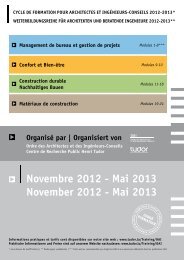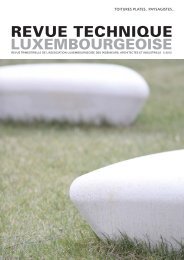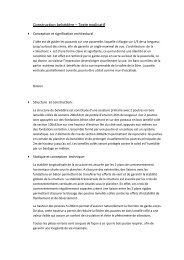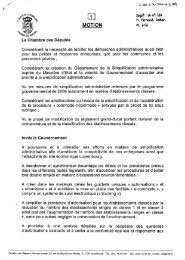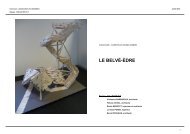Revue Technique Luxembourgeoise
Revue Technique Luxembourgeoise
Revue Technique Luxembourgeoise
Create successful ePaper yourself
Turn your PDF publications into a flip-book with our unique Google optimized e-Paper software.
20 ARTICLES | REVUE TECHNIQUE LUXEMBOURGEOISE 3 | 2011<br />
Kebony is the award-winning sustainable substitute for tropical hardwood and preservative-treated timber. This innovative<br />
Norwegian company was recently named in the Global Cleantech 100 as one of the world’s most promising<br />
clean technology companies. Kebony is the choice of leading architects, builders and designers looking for not only<br />
exceptional quality, durable, attractive, low-maintenance and cost-effective materials but those that are environmentally-friendly.<br />
KEBONY AND KEBONIZATION_<br />
© JL Deru<br />
Kebony has created a new market for sustainable wood,<br />
which has proven to be very popular with the industry -<br />
used in a number of impressive projects from high-profile<br />
commercial builds and public service contracts to large residential<br />
builds. Its product can be used for decking, cladding,<br />
roofing, windows, indoor and outdoor furniture, yacht<br />
decking and other construction materials. In testament to<br />
this, Timber Trade Journal awarded Kebony a Highly Commended<br />
for the ‘TTJ Market Development Award’ sponsored<br />
by TRADA for the demonstration of “steadfastness<br />
and ingenuity in pursuing their objectives, to push forward<br />
the boundaries of what can be achieved using timber and<br />
wood products”.<br />
Through the revolutionary environmentally-friendly process<br />
of Kebonization, wood species such as maple, pine<br />
and beech are given the same aesthetical and physical<br />
properties as rainforest wood. The wood is impregnated<br />
with a patented mixture based on furfuryl alcohol, a liquid<br />
produced from agricultural crop waste, which then reacts<br />
within the wood fibres. The process permanently strengthens<br />
and stabilises the wood, making it more durable against<br />
biological decay.<br />
Kebony’s patented modification methods are the result of<br />
many years of research and development in Norway, Sweden<br />
and Canada. They are also based on collaborations<br />
with universities and institutes in Germany, the Netherlands,<br />
USA and South Africa, including the Norwegian Institute of<br />
Wood Technology, the Norwegian Forest and Landscape Institute,<br />
the SP Technical Research Institute of Sweden, SHR<br />
Timber Research in the Netherlands, and the University of<br />
New Brunswick and Woodtech in Canada.<br />
In 1997 Kebony (WPT) was founded to develop and commercialize<br />
the technology, termed ‘Kebonization’. A pilot<br />
production facility opened in 2003 and from 2004 to 2007,<br />
Kebony delivered products to multiple large high profile<br />
construction projects in Norway. In 2007, Kebony started<br />
the construction of an industrially scaled plant which was<br />
opened in January 2009.<br />
Why Kebony, and modified woods in general, are<br />
gaining popularity<br />
Kebony is a modified wood that is unique in its offering<br />
- it is the first sustainable alternative to endangered tropical<br />
hardwoods such as teak, which is not only an expensive<br />
resource, but one that is rapidly diminishing through ongoing<br />
deforestation.<br />
Kebony inspired and encouraged others, creating a new<br />
market. As such, Kebony works with its peers to battle<br />
against its largest competitor, tropical wood, and the global<br />
risks associated with unsustainable logging. Kebony is<br />
increasingly popular due to its exceptional quality, dura-




